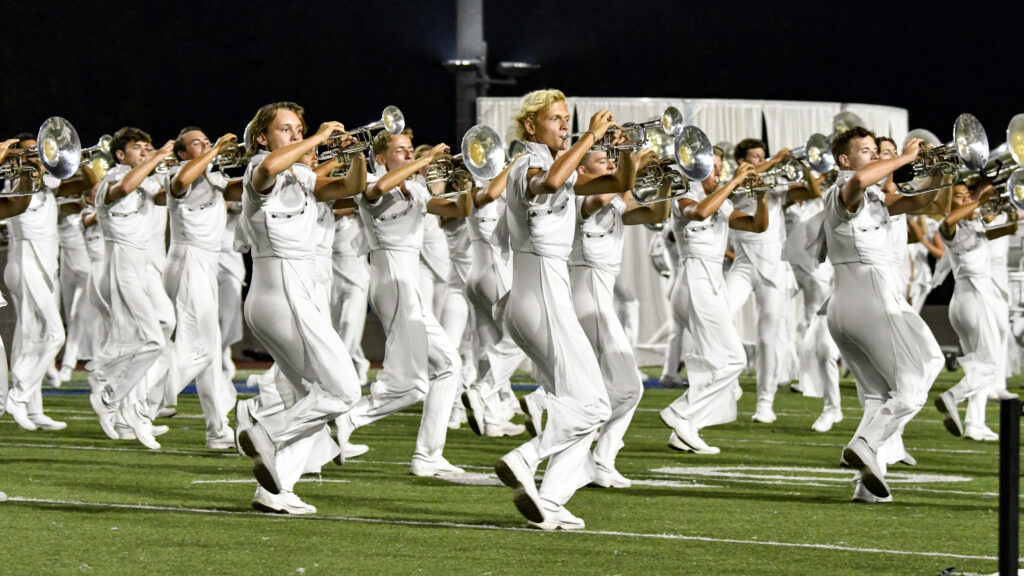This weekend is an important holiday for the drum corps community. I’m not talking about the Annual American Turkey Roast that will occur on Thursday, but rather the holiday on the day after: The Friday after Thanksgiving marks the traditional kick-off point for the new drum corps season. Drum corps fans everywhere are rubbing their hands in eager anticipation; drum corps auditionees everywhere are rubbing their hands in an effort get some feeling back into them after too much last-minute practicing.

I’ve received several e-mails in the last week of people panicking in a fit of first-camp nerves. “I don’t know anyone,” they fret. “I just don’t think I’m ready,” they wail. “How in the world can I stand next to kids I see as rock stars and play the same music as them?” they wonder. My universal answer is: Rst assured, you are not alone! I felt the same way the first time I went to audition with the Glassmen, and I had two friends in the corps and had already marched somewhere else for a couple years. New situations are always hard, especially when you don’t really know what to expect! Hopefully I can alleviate that just a bit by giving you an idea of what to expect. A few corps operate by having scheduled audition times rather than full camps, and if that’s the case for the corps you’re auditioning for, you can stop reading right here; I have no similar experiences on which to draw, and thus no insight to offer. Most corps, though, have a full camp in November, and I’ve been to several of those! Here’s a rundown of what happens at a camp. Remember that all corps hold somewhat different schedules, so keep that in mind. On Friday night, you’ll arrive at the rehearsal site, register for the camp, and put your stuff away. Most corps start with a brief introductory meeting in which you’ll get to meet all the staff, hear about the corps’ history and philosophy towards drum corps, and get a brief overview of the weekend and the overall objectives. They’ll probably clue you into the audition process and let you know of any special rules. Then you’ll split into sections, where you’ll get a similar rundown on the staff, the audition process and the audition criteria. You’ll also get a basic crash-course on the technique they use in your section. Then you get to start learning some of the exercises and rehearsing! The rest of the weekend is organized pretty much like any drum corps day: Eat, rehearse, eat, rehearse, eat, rehearse, eat, shower, bed. At some point in the weekend you’ll likely have an individual audition with the staff person for your section; they’ll let you know what to work on and how likely it is that you’ll make the corps. Some corps do not cut anyone at the first camp, but they will let you know if you need to strongly consider auditioning for another section or another drum corps. Other corps may give you a definitive yes-or-no commitment; most will sit somewhere in between, wanting to see how much you improve from camp to camp. At the end of the weekend the meeting process will be reversed, first with your caption staff letting you know what you should work on for the next camp, then with the corps director and full corps, wrapping up the weekend and setting the stage for the next camp. Logistics aside, most corps believe in drum corps and camps as an educational experience. The best advice I’ve ever heard about approaching an audition camp is to try to take a step away from the audition process and just have a good time. Try to learn as much as you can, meet new people, make new friends, and enjoy yourself. Look at it this way — the world could change radically tomorrow, and this may be your only drum corps experience ever. Do you really want it to be something you remember with a lingering chagrin because you approached it with such a sense of dread that it was impossible for you to enjoy? Trust me, everyone is nervous — even the staff, administration, and vets — yes, even the five-year member in the corner who was last year’s finals soloist. At the same time, no one is there to try to intimidate you. The great part about corps is that come November, everyone is on an even plane all over again, so you have just as much chance of achieving success as anyone else in the room. Don’t get hung up on the “Wow, this is drum corps!” factor. Everyone had to go through their first camp at some point, and a lot of us got cut at least once before ending up where we were. And remember that what you see on the finals DVDs is the product of three months of nonstop polishing, and no one is in tip-top shape come November. Try to lose the rock-star impression of the vets you’re playing next to — we were all rookies at one time or another, and we all still sleep on the same floor and shower in the same showers. In most corps, what the staff is looking for is how fast you learn and how well you receive instruction. Be flexible. Don’t do that thing where making one mistake makes you make ten more mistakes. And don’t think about competing about the other folks for a spot; just do the best you can, because you can only control yourself. Relax and enjoy yourself! You’ve done the hard work and now it’s time for the payoff, so have a good time with it. A few words of logistical advice: Have all your forms filled out before you go — it makes standing in that registration line go a lot faster for everyone — and take along the corps’ emergency phone numbers; if you are delayed, let someone in the corps office know. Make sure the corps has your travel plans well in advance, especially if you need to be picked up at the airport or bus or train station (in fact, if you haven’t sent in your pick-up information yet, you’re already late). If you’re late getting to the rehearsal site, go check in immediately to find out what you’ve missed — corps need to keep an accurate count of who’s in their facilities, and if your mom calls to see if little Timothy made it through the ice and snow OK and the corps tells her you’re not there because you never checked in, suddenly they’ve got an emergency situation, even though in reality you’re safe. Don’t take a huge suitcase for two nights; all you need are the clothes on your back (dress comfortably for all situations), two changes of clothes, some PJs, your sleeping bag and pillow, a towel, and toiletries and any medications. Bring layers so that you can adapt to changing environmental situations — some buildings are severely over- or under-heated. And don’t forget to take a method of payment for your audition fees, a copy of the audition packet (if you got one early), any sheet music you may plan to audition with, and a copy of your medical insurance card! And finally — print out the paragraph below and give it to your parents. Good luck! A note to parents: PLEASE resist the urge to go rescue your child this weekend. Younger auditionees especially can get overwhelmed at first, and may (probably will) call home on Friday night feeling underconfident and in over their heads. This will pass if you give it a chance! Encourage them to stick it out, do their best, meet some new people, and have a good time. Too often I’ve seen parents come in and grab their child, telling the corps director, “S/he’s only (insert corps-eligible age here)!” when several other teens of the same age — some of them vets — are muddling their way through, two doors down. Drum corps isn’t easy. It isn’t meant to be! But if your child is not equipped to make it through two days of a camp situation, s/he is certainly not prepared for a summer on tour, so if you’re going to allow your child to have this experience, you need to put a damper on the parental instinct and let your child get through it on his or her own. Remember, this can be a major learning opportunity in areas that go far beyond music and marching; don’t rob your child of that just because s/he is not enjoying him or herself after three hours. If you both can make it through the weekend, I think you’ll be pleasantly surprised at the result. Emily Tannert is a sophomore music education/percussion performance major at Louisiana State University in Baton Rouge, La., and holds a journalism degree from Northwestern University. Emily aged out of the Glassmen in 2003 and was assistant tour manager for the corps in 2004 and 2005. You can contact Emily at [email protected].





